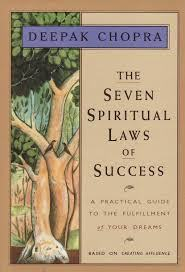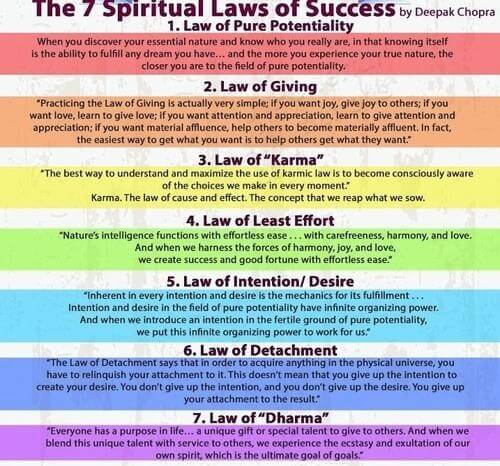Deepak Chopra‘s book, “The Seven Spiritual Laws of Success,” has been such a touchstone for me that I’m writing about each of the seven laws.

I spent most of my adult life as a type-A linear thinker – I firmly believed I needed a plan for my career and life, and that success would come from working hard to achieve the steps on that plan.
Then I saw people, most notably my husband, getting where they wanted to be through serendipity and good luck.
It was hard to release my white-knuckled grip on my plan, in part because I so feared poverty and failure, but I began to see that sometimes it takes releasing your original plan to open up to something even better.
Deepak Chopra talks about the value of flexibility in the sixth spiritual law, detachment. In my 20s and 30s, I would have heard detachment as being in conflict with goals, but Chopra says, no.
“This doesn’t mean you give up your intention to create your desire, you don’t give up the intention and you don’t give up the desire, you give up your attachment to the result.”
Let’s say you’re planning a road trip. You map your direction and head out, only to run into a huge traffic jam. (This analogy plays better for people who remember traveling before apps that warn you of heavy traffic, but stay with me …) You see the tail lights and detour onto side roads, which could lead you to some unexpected stop, or maybe even cause you to you re-evaluate your destination, instead of fuming as you sit idling on the highway.
Chopra applies this idea to your life’s goals and intentions, saying, “You want to go in that direction, you have this goal, but between point A and point B, there is an infinity of possibilities. With uncertainty factored in, you might change direction in any moment if you find a higher ideal or if you find something more exciting.”
Why do we – and I confess I have often been guilty – get so attached to our original plans that we can’t see Plan B promises something just as good or better?
For me, it’s wanting security. I know, or at least thought I knew, what’s in store on my planned path, while altering course feels risky. What if I fail or get hurt on that alternative route?
Apparently, I’m not alone in wanting to feel safe from the dangers of the unknown.

“People are constantly seeking security. Even attachment to money is a sign of insecurity. And you will find that this seeking of security is actually a very ephemeral thing. You might say, when I have X million dollars, then I’ll be secure. Then I’ll be financially independent and I will retire. Then I will do all the things I really want to do. But it never happens. Never happens!” Chopra says.
“Those who seek security chase it for a lifetime without ever finding it,” he adds. “It remains elusive and ephemeral because security can never come from money alone. Attachment to money will always create insecurity no matter how much money you have in the bank. In fact, some of the people who have the most money are the most insecure.”
I’ve learned in recent years that the known and the planned feel safe but that’s not necessarily true. My mom had landed a good corporate job when she developed cancer and died at 51. Plenty of people have built the trappings of middle class happiness only to get laid off, have their spouse leave, get gravely ill.
Life plants little surprises along our paths, no matter how carefully we choose our steps. So instead of trying to avoid the landmines of the unknown, Chopra counsels that we accept life’s uncertainties.
“Security and certainty are a result of rigid attachment to the known, however the known is nothing other than the prison of past conditioning,” he says. “Uncertainty on the other hand is the fertile ground of pure creativity and freedom.”
“Without uncertainty and the unknown, life is just a stale repetition of outworn memories. You become the victim of the past and your tormentor today is yourself left over from yesterday,” he adds.
Do you really want to Groundhog Day your way through your life?
“The known is our past. It’s just the prison of past conditioning. There’s no evolution in that.”
At what stage in your life do you think you’ve done enough already and you only need to repeat what already feels comfortable? Only go to restaurants you’ve tried before, only socialize with existing friends, only engage in hobbies you know?
Why not try something new once in a while?
“You’re also less likely to force solutions on problems, which enables you to stay alert to possibilities,” Chopra says. “Good luck is nothing but preparedness and opportunity coming together.”
How to put the law of detachment into practice:
- Allow yourself and those around you the freedom to be as they are. Don’t impose your idea of how things should be. Don’t force solutions on problems, thereby creating new problems.
- Accept uncertainty as an essential ingredient of your experience. In the uncertainty, solutions will spontaneously emerge out of problems, out of confusion, disorder and chaos.
- Enjoy the excitement that comes from remaining open to an infinity of choices. By being open to possibilities, instead of locking down on a single plan, you will experience all the fun, adventure and mystery of life.
Past posts in this series:
- The Seven Spiritual Laws of Success: #1, the law of pure potentiality
- The Seven Spiritual Laws of Success: #2, the law of giving
- The Seven Spiritual Laws of Success: #3, The law of karma
- The Seven Spiritual Laws of Success: #4, The law of least effort
- The Seven Spiritual Laws of Success: #5, The law of intention and desire
Related blog posts:

2 Comments
Leave a reply